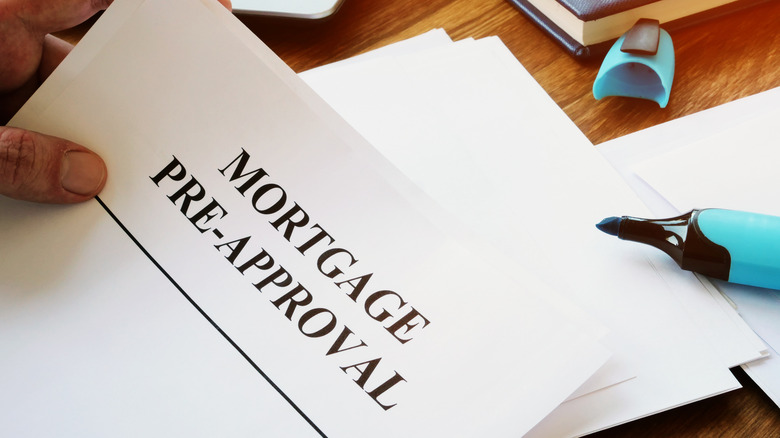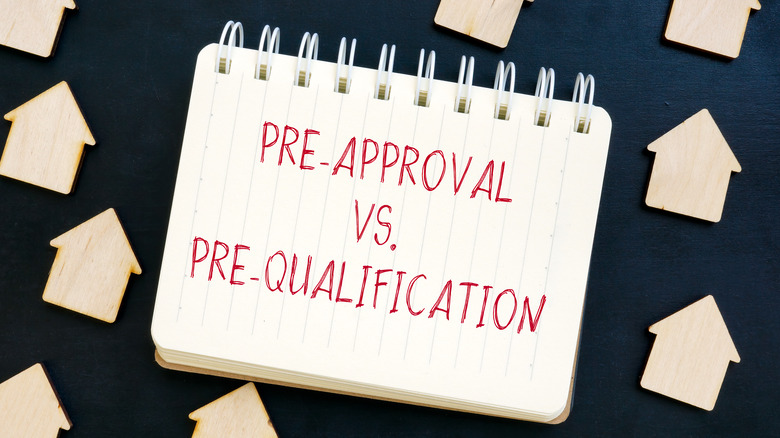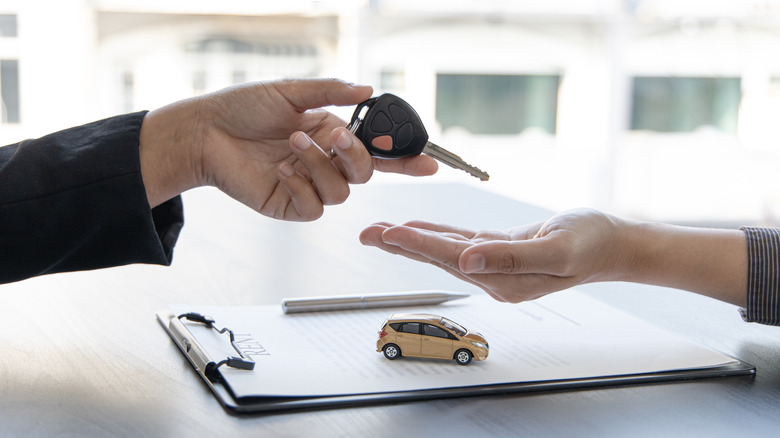What You Need To Know About Mortgage Pre-Approvals
Becoming pre-approved for a mortgage is an essential part of the homebuying process and should be completed as early as possible. It's basically a lender's way of saying that, if your finances don't change drastically before you close on the home you're interested in, they will give you the money to buy it, as per Credit Karma. However, obtaining a mortgage pre-approval doesn't always mean you will go on to receive the total amount promised. The Consumer Financial Protection Bureau reports that upon investigation, some applicants are denied due to financial discrepancies.
Most sellers favor pre-approved buyers for mortgages because it means the sale is most likely to close. This is because pre-approved buyers' finances are often more in order than those who have not been through the process. Pre-approval also helps potential homebuyers, as understanding how much a bank is willing to lend them through a mortgage can assist in crafting a more realistic housing budget.
Pre-approval isn't the same thing as pre-qualification
A mortgage pre-approval is a step above a mortgage pre-qualification. It's a deeper look at your unique financial situation instead of just a quick estimate based on surface information. To get a pre-qualification, you provide a lender with your name, contact number, and a general assessment of how much money you make, any assets you currently have, and any debt you hold. The lender does not verify these numbers, but if you are truthful, they can still give you a reasonable ballpark estimate of what kind of price point to consider as you shop for homes, per Ramsey Solutions.
However, being pre-qualified will not lead to actual financing because all of the numbers are just estimates and not subject to any investigation. It's easy enough to hide debt from your lender or inflate your income during pre-qualification. Due to this, to actually obtain a mortgage, you have to take things a step further and substantiate any claims you made with the pre-approval process. However, it's important to note that pre-qualification is a completely skippable step in the mortgage process. If you are ready to move forward quickly, you can gather the required information and proceed directly to pre-approval.
You have to prove how much money you make each year
The mortgage pre-approval process includes gathering plenty of documents to prove your current financial situation. Be sure to have copies of your social security card, bank statements, tax returns, employment history with payslips, and proof of your current credit score. If a family member or friend is assisting you financially with purchasing a home, acquire a letter of support from them. The letter should state the amount of the gift received, when it was given, and that it is, in fact, a gift and not a loan you will need to repay eventually.
However, pay stubs from your current employer might not be sufficient, and if you earn any secondary income from social security, child support, alimony, or even stock dividends, that you should also report it to your mortgage lender. That way, they can have the fullest picture possible of your current financial situation.
If you frequently change jobs, you might have more explaining to do
Before approving an applicant for financing, one of the key things that mortgage lenders look for is financial stability. Essentially, lenders want to make sure that your paycheck is steady so that they can have a portion of it each month. Because of this, if you haven't been at your job for very long, or if you frequently change jobs, you might have a little bit more explaining to do to justify your choices, per Landmark Home Warranty.
According to the Connecticut Business & Industry Association, job-hopping is now more popular than ever for things like seeking out better company culture, enjoying more work-life balance, and taking home a larger paycheck. However, your mortgage lender is less likely to be interested in your reasons for your employment history. Instead, they'll be more interested in a continued upward trend in guaranteed income. Their number one fear would be that you will be in a completely different financial situation six months from now, and they won't receive a return on their investment. One way to avoid this is by waiting until you've been with your new company for six to nine months before applying for pre-approval. You can also supply your lender with an irrefutable paper trail that, with every job change, your finances have never been under stress and only continue to improve.
Lenders are known to ask tricky questions
A mortgage lender's number one priority is ensuring a return on investment. They want to make sure that every single cent they give out will land right back in the institution's pocket. Because of this, the deep dive that lenders do on your finances might seem a little intense at times. Lenders will ask questions that might seem too personal, and might come across as prying or nosy.
For example, according to Bank of America, you might be asked why you put your car payment on your credit card instead of paying it off each month. You will also be quizzed about any other large credit purchases. As long as you can honestly explain your financial choices, the pre-approval process should proceed smoothly, but be ready to answer the questions as they arise. To that end, MarketWatch recommends that you make financial accounts like PayPal, Venmo, and Cash App as private as possible, lest you have to explain payments between friends with questionable memo lines to your mortgage lender.
It can take up to two weeks for full approval
Getting pre-approved for a mortgage isn't a quick process. While it's not drawn out by any means, it's not uncommon for a traditional lender to take up to 10 business days for a pre-approval, according to Credible. This is why it's better to get pre-approved as soon as you can, so you don't miss out on putting in an offer for a great house while you are waiting.
However, mortgage pre-approval doesn't last forever, either. Once you get the go-ahead, approval lasts for 60 to 90 days barring any severe change of circumstances. If your financial situation does change drastically, contact your lender right away to receive an updated letter. Examples would be if you need to spend your down payment on an emergency or a family member makes a large contribution to your down payment. If you cannot close on a home before your current letter of pre-approval expires, contact your lender about two weeks in advance to ask about extending things. This way, you won't be without pre-approval for too long and won't need to pause your house-hunting efforts.
Apply with more than one lender for the best rates
Just like with any major purchase, choosing your mortgage lender isn't a choice to make lightly. To get the best deal, most homeowners approach multiple lenders for information and options. Because of this, homeowners who shop around typically get the best rates and can save thousands of dollars throughout the loan.
NerdWallet's national survey discovered that buyers who approached at least five lenders for mortgage pre-approvals saved an average of $430 in interest over the loan's first year, and with savings continuing to compound as the loan aged. The survey also discovered that collectively, American homebuyers could save up to $776 million a year by comparing mortgage lenders. To find the best lenders in your area, you can speak to family, friends, your real estate agent, or a financial advisor. However, you don't always need to approach five lenders. Experts at Time recommend at least two to three lending options, but the more you have to choose from, the better.
You can still be pre-approved with bad credit or a small down payment
Homebuyers traditionally try to save up to 20% of the total purchase price for a down payment. This is because anything below 20% is typically subjected to private mortgage insurance, commonly called PMI, per Investopedia. Buyers can pay the insurance premiums monthly, and they typically cost from 0.25% to 2% of the total mortgage per year. The final PMI number depends on things like the actual size of the down payment, how long your mortgage is for (15 years, 30 years, etc.), and your credit score. Because of PMI, it's still possible to purchase a home for a great rate with a small down payment, as long as you have a good credit score. Buyers with good credit scores can also consider options like government loans from the United States Department of Agriculture or the Department of Veterans Affairs, depending on their eligibility.
However, if you currently have poor or average credit, which according to Rocket Mortgage, is a score below 600, there are still options. If your score is at least 500, you might still qualify for a mortgage through the Federal Housing Administration if you can save up at least 10% of the purchase price. If you have less than 10% on hand, you'll need a score of up to 580. If your credit score is below 500, you will need to raise your credit score before applying for mortgage pre-approval.
Build up your credit before applying
The better your credit score, the lower your potential interest rate on your mortgage. This can save you money in the long run. For example, you could expect to pay roughly $850 a month for 30 years on a $200,000 loan with a 3% interest rate. However, if you have an interest rate of 5%, your monthly payments could be up to $1,175. That's nearly $10,000 more in interest over the life of the loan. So, take small steps to build your credit by paying your monthly minimums and aiming to use only 30% of the credit available to you, according to Investopedia.
However, applying for mortgage pre-approval can briefly lower your credit score, as it's akin to applying for a loan. That means it requires a "hard hit" on your credit score with one of the three main credit agencies (via Experian). So be ready ahead of time for a temporary dip.
Negotiate your interest rate with your lender with a buydown
If you pay your lender a "buydown" charge upfront, you could save thousands in interest down the line. Remember, mortgage companies can charge you a higher interest rate to help lower your closing costs, but you can also pay them a bit more to reduce the overall price, per Quicken Loans. However, whether or not you choose to use this strategy depends on two main factors: your current cash reserves and your intended length of stay in your new home. If you purchase a starter home and don't intend to stay more than five years, then the savings you could incur from buying down your interest rate could be negligible (via Dream Home Financing). However, for a 15-year or 30-year mortgage, the interest savings would start to add up.
On the other hand, it might not be appealing to have to cover yet another cost while closing on your home. The buydown cost would be on top of the cost of moving, furnishing your new home, and your down payment. If coming up with the cash at the start is too difficult, it might be worth paying a higher interest rate over time in the name of convenience.
Don't make any big purchases during the process
Taking out a mortgage is likely to be one of the biggest financial choices you will ever make, according to The Mortgage Reports. You've been saving your down payment, considering the best neighborhoods and features you want in a home, and now it's finally time to make it happen. One of the worst things you can do for your chances of success during the mortgage pre-approval process is taking out a new line of credit, according to the U.S. Bank. So, while you might also need a new car while you look for a home (or a boat, we won't judge), purchasing one on credit can really jeopardize things for you, as your debt to income ratio will increase. If this happens, your financier will no longer have accurate information and is unlikely to approve you.
To avoid this happening, only open one large line of credit at a time. Be sure to have your mortgage sorted before opening a car or boat payment. And by sorted, we mean a pay period or two after closing day. Or, better yet, pay cash for the item if it's needed right away, which won't affect mortgage financing options at all (via Louisiana Federal Credit Union).
Getting pre-approval doesn't guarantee full approval
In certain circumstances, being pre-approved for a mortgage doesn't translate into being fully approved. This could be for several reasons, like a significant change in your credit score or a change in your current employment situation. While it makes sense that major financial changes would impact the availability of a loan, other contingencies are more difficult to expect. That is, the lender's final approval can be determined by the home you choose and its condition.
Fox Business reports that mortgage lenders have been known to deny financing on homes that run into problems during the appraisal process. If the home is appraised for less than the amount you've been pre-approved for, it's likely your lender won't finance it, as it's a poor investment. If this happens, you can ask the seller to lower the price to the home's actual appraised value, or the least attractive option, cover the price difference yourself.
Mortgage pre-approval makes you a stronger buyer
Being pre-approved for a mortgage makes you a stronger buyer than someone who is only pre-qualified for one. This is because your financing is more likely to come through than that of other potential buyers, so the sale has a higher chance of closing. Because of this, once you obtain pre-approval, sellers might consider your offer over others. This could be very beneficial in a hot housing market as the only serious competition for your dream home would then be an all-cash buyer.
Besides the competitive edge, obtaining a mortgage pre-approval also makes you a stronger buyer because it gives you the chance to iron out any hiccups in your finances before trying to make an offer on your dream home. For example, Rocket Mortgage reports that buyers who are only pre-qualified instead of pre-approved might run into problems. They might have a high debt-to-income ratio or an incorrect poor line of credit that they cannot fix in time for the home they want. However, pre-approved buyers have plenty of time to correct discrepancies before moving forward.
Don't be discouraged if you are rejected
Sometimes, your application for mortgage pre-approval might be declined. However, this isn't a reason to panic, as most reasons for pre-approval rejections are completely fixable, often in as little as a few months. If your application is rejected, be sure to ask the lender for the exact reasons, so you can correct them going forward, per One Trust Home Loans.
If your credit is too low, NerdWallet reports that you can raise your credit score by 100 points by paying your card balances off in such a way that you always hit the monthly minimums for each account. You can also ask family or friends with better credit to add you as an authorized user to their credit cards. According to Forbes, another common reason for mortgage pre-approvals getting denied is insufficient funds for a down payment, or inadequate reserves, which is the money you would use to pay the first few months of the mortgage after closing. If this is the case, a few more months of savings could make all the difference.













